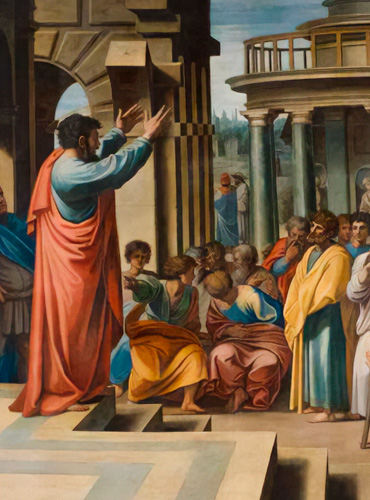Monday of the Fourth Week of Easter
In today’s Gospel, we have the continuation of yesterday’s Good Shepherd discourse. Today Christ continues speaking of the acts of the good shepherd, and, in particular, we can consider three things: first, the word good that Christ uses, second, the difference between good and bad shepherds, and, third, that the Father loves Christ “because [He] lays down [His] life in order to take it up again.”
First, Christ states clearly at the beginning of the Gospel “I am the good shepherd.” The Greeks used two different words for good: agathos, which is a moral goodness (and from where we get the name Agatha), and kalos, which, in addition to being a good person, has a sort of attractiveness, a sort of loveliness or beauty.[1] When Christ calls Himself the good shepherd, He uses kalos, the second word. Christ’s goodness isn’t just something abstract or theoretical; it’s a goodness that draws people to it, a goodness that inspires and delights. This is the way our holiness should be if we truly live in imitation of Christ: people should be able to see God in us and working through us, and thus be drawn, not to us, but to Christ, the source of our goodness. Is this the reality? If not, why not?
Second, Christ makes a comparison between the good shepherd and the bad ones. Saint Thomas Aquinas says there’s three differences between them: first, they differ in their intentions. The good shepherd looks out for the good of the flock, to benefit his sheep, whereas the bad shepherd wants to get something else, his wages, meaning, he’s looking out for his own benefit. Second, they differ in their care for the sheep: the good shepherd looks at the sheep as his own, meaning, not just as a possession, but also as something he loves and cares for, whereas the bad shepherd, who doesn’t see the sheep as his, doesn’t care at all. Third, they differ in what they love: the good shepherd loves the sheep so much that he is willing to lay down his bodily life in order to keep them safe, whereas the bad shepherd loves himself.
We can apply these differences to ourselves and our vocations, whatever they might be: how do I look after the things or people God has entrusted to me in my life, be it a spouse, a child, my fellow religious, the children I teach or care for? What do I love when I love them? Do I seek my own benefit or theirs? The true test of our love comes in moments of difficulty or challenges: how do I respond in those moments?
Lastly, Jesus has a rather curious line towards the end of the Gospel. He says: “This is why the Father loves me, because I lay down my life in order to take it up again.” Aquinas notes that this seems a little odd if we take it literally, namely, that the Father loves the Son because He dies. It’s not as though the cause of the Father’s love for Jesus is that He dies (as though the Father didn’t love Him before, and Christ made the Father love Him); indeed, we know that the Father loves the Son eternally, and that, in our case, He has loved us prior to our doing anything good. Rather, Aquinas explains, Christ could be referring to the effects of the Father’s love, the exaltation of His Body, that follows upon His death, or that His death shows how much He loves God. In either case, there is a lesson for us: Aquinas says God “loves” someone, that is, gives the effects of His love, grace upon grace, to the one who follows His commandments. God is never outdone in generosity: do we believe that, and act accordingly?
Secondly, Saint Ignatius of Loyola tells us that love is shown more in deeds than in words: do we “lay down our lives” for others, so that the love of God might be revealed? Today, as we continue our Easter journey, let us ask for the grace, through the intercession of Mary, the Divine Shepherdess, to be docile sheep in Christ’s flock, and to love and trust Him as our Good Shepherd and to reflect that
[1] Cf. Barclay’s commentary on this passage.






